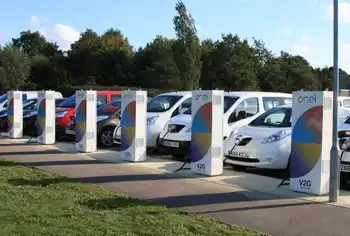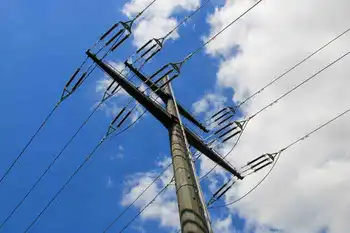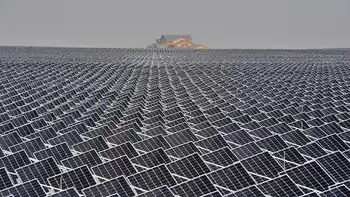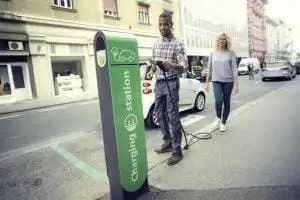Power play for utilities
FLORIDA - Advancing technology could soon allow electric utilities to enter the competitive telecommunications field, using their power wires and fiber-optic cables to bring broadband voice and data service to customers' homes.
Big regional phone companies are already on the defensive, lobbying state governments in Florida and elsewhere to restrict municipal electric companies from entering the telecom business. The municipally owned power companies argue that, even if they don't opt to sell Internet access and phone service, they ought to have the option to sell it. Local consumers paid for their systems, they say, and local consumers should benefit if those systems can sell communication services for less than conventional phone companies can.
A generation ago, competition between electric power and local phone companies would have seemed unthinkable. Although both have wires connecting people's homes to the wider world, they were in fundamentally different businesses.
"Technology is certain to improve," said Grant Lacerte Jr., attorney for the Kissimmee Utility Authority. "In a few years, we think we could roll out some kind of phone service that our citizen owners would want, and if we could do it at a reasonable cost, we would probably do it. I don't see where it is in the public interest to stop this from happening." KUA is already indirectly involved in the phone business. Last year, it began offering local and long-distance service in Orange, Osceola and Polk counties in partnership with Sparks Communications of New Smyrna Beach. The utility serves as a marketing agent for the other company. Other U.S. power companies have already entered the telecom business, but only a handful are using their own wires. The technology to do that, known as "broadband over power lines," is in its infancy. Still, some municipally owned power companies, including KUA, say they want the option to move into the business when the time is right.
BellSouth, Florida's largest phone company, strongly disagrees.
"We believe there is already plenty of private telecommunications competition," said Marta Casa-Celaya, BellSouth's Florida spokeswoman. "The business of government isn't to run a parallel structure that would in some cases pose direct competition."
A draft telecommunications bill being prepared by Gov. Jeb Bush's office for this year's Legislature would effectively block publicly owned power companies from entering the telecom business. Florida has an assortment of municipally owned electric utilities, included KUA and Orlando Utilities Commission.
The phone companies see a potential problem coming their way even before broadband over power lines becomes a real-world commodity. That's because many government-owned power companies already own fiber-optic networks that they use to operate their electrical systems.
"Municipalities have very sophisticated communications networks in place for their own needs," said telecom consultant John Malone, chief executive of Eastern Management Group in Bridgewater, N.J. "Since 1996, as many as 100 municipalities have decided to let their residential customers use their networks," Malone said. "Now, some state legislatures are deciding that municipalities don't belong in the telecom business."
Casa-Celaya, the BellSouth spokeswoman, notes that regional phone companies, though virtual monopolies not so long ago, now face competition from several directions. Cellular phones continue to grow in popularity, and "Voice over Internet Protocol" - which uses the technology that powers the Internet to transport phone calls - now allows cable-television companies and others to offer phone service.
"There is already competition, and it's not just coming from other phone companies." Casa-Celaya said.
Allowing local government into the phone business, she said, would put taxpayers' money at risk. "They would need to construct telecom infrastructure. There would be billing issues and issues of customer churn," she said. "It's not an easy business."
But Barry Moline, director of the Florida Municipal Electric Association, said the problems could be solved. In the long run, he said, customers would benefit from more competition and choices.
"All over the country, we have fiber-optics rings around a lot of municipal and investor-owned utilities," Moline said. "If they are now only using a hundredth or a thousandth of the fiber's capabilities, why not let their communities use the rest? This is a fantastic asset. It makes no sense not to use it."
Related News

Vehicle-to-grid could be ‘capacity on wheels’ for electricity networks
WASHINGTON - “There are already many Gigawatt-hours of batteries on wheels”, which could be used to provide balance and flexibility to electrical grids, if the “ultimate potential” of vehicle-to-grid (V2G) technology could be harnessed.
That’s according to a panel of experts and stakeholders convened by our sister site Current±, which covers the business models and technologies inherent to the low carbon transition to decentralised and clean energy. Focusing mainly on the UK but opening up the conversation to other territories and the technologies themselves, representatives including distribution network operator (DNO) Northern Powergrid’s policy and markets director and Nissan Europe’s director of…




